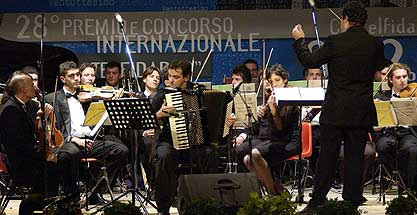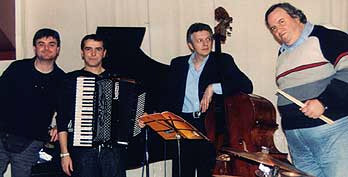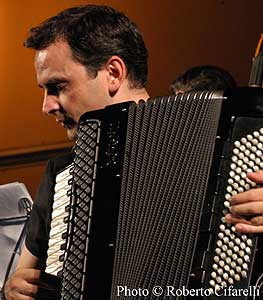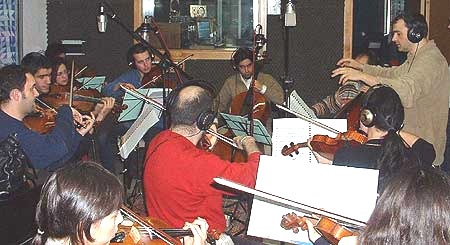Q. Tell us please how did you first start with the accordion and who were your first teachers? A. I fell in love with the accordion thanks to my cousin, when I accompanied him to his music lessons. I followed everything with so much interest that the teacher noticed my passion and convinced my parents to let me learn music. His name was Aldo Rampa; later on, I studied classical accordion (chromatic system with free bass) with another teacher - Vittorio Pomante. I have graduated form the Pescara Conservatory in complementary subjects and studied cello for four years. Subsequently I have gained my diploma in jazz piano performance at the Milano CPM under guidance of Franco D'Andrea. Q. How did you begin to play jazz on accordion? A. I had started playing folk music which still contains a fair share of the melodies of my improvisations. Some time later, I realized that I was very interested in altering pieces and this was the beginning of my interest in improvised music. My first experiences in jazz music were caused by my acquaintance with Peppio Principe, an important figure in the Italian accordion world. Fortunately, I have had some opportunities to play with him. At the age of eighteen, I switched to electronic keyboard instruments for the performing of pop/rock music. When I was 23-24 years old, I was working on composing music for theatre (the kind of work I'm still busy with) and that was how I turned to accordion again. At the same time, I started to study jazz piano. At this point it was inevitable to try on accordion, everything I had learned in jazz and in 5 years I took part in one of the first courses for jazz accordion of a new generation with various didactic texts published.
Q. What possibilities do you see for the accordion as a jazz instrument? How do you see the accordion comparing to other instruments with a longer and more established jazz reputation. A. Some people think that the accordion is not an appropriate instrument to play jazz, and others insist that the accordion is the best instrument possible. Naturally the truth is that the music which derives from brain and heart doesn't depend on any instruments. Any case, the jazz environment in general has accepted the accordion well. Q. It is known that the art of jazz supposes an art of improvisation. Is it possible to learn to improvise? A. In this regard there are many methods which demonstrate that it is possible and some others which demonstrate the opposite. Judging from my own experience as an improviser and teacher, I am convinced that it is a question of time. Let me explain this: every person has different ways of mastering skills and therefore this has an effect on the performance. A student with good academic training would tend to get all the details of the performance prepared and hence the improvisation would also be limited in creative sense though it would be very precise. Other students, on the contrary, would have the tendency not to hinder their creativeness even if they are not so precise. Using personal ways of work I proved that these tendencies can be modified even though every students needs different time for this. Actually, improvisation has something to do with personal character and you can imagine this is somewhat of a challenge... but it is not impossible.. Studying and understanding the history of jazz, its harmony and the musical laws which are part of the various jazz periods, is something which can be easily resolved with the same diligence as the other subjects. Actual method is absolutely adequate also at the high level. A final reflection: - "It is really useful to denaturalize your own attitudes!!!" - "What artist has created ART without putting himself (personality) into the ART?" Q. Could you name some jazz performers/composers who influenced you in your artistic life? A. Among the accordionists there are certainly Peppino Principe and Art Van Damme. I like very much Thelonious Monk and Keith Jarret among the pianists but most of all I like the trumpeter Miles Davis. It should be added, that I have never tried to imitate other musicians. Since I was a child, I always wanted to see the things in my own way. Q. What is the source of your improvisation on the stage; is it an image or pure musical thoughts, phrases? A. If I play jazz standards, I usually try to act according to the situation taking the sound actions from the band and the audience. It is different when I play my own music: I have created a project "Solo Accordion Project" where my improvisations are based on only elements, sometimes even extra-musical elements. As a matter of fact on the CD "Improvvisazioni Guidate" I improvise completely concentrating on the elements which are in my head, such as: Noises, Tango, Melody, etc. Q. Many accordionists who obtained a classical music education would like to play jazz too. Is it possible for a performer to combine jazz and classical music? What is the difference between playing jazz and classical music? A. I think that the basic difference between jazz and classical music is following: - in classical music there is an ABSOLUTE INTERPRETATION to maintain, the essential purpose of the performer is to transmit the composer's idea which is in the score. - in jazz it is just the opposite: the musician has to transmit his/her personal vision of the piece. One has to be aware what the classical music intends and it does not forgive, as soon as you moved aside from it, you are practically a jazzman. However, I think that it can be very important to approach the mentality of improvisation, because it can broaden the musician's mind and open the musician to new and most important forms of interpretation. Concerning the jazz performance, unfortunately I have to confess, that if someone from the classical music world begins to improvise, he loses his precision at the concerts and starts to discuss /question his whole artistic path until he reaches the point when he is "not fish, not meat". I am convinced that this combination is possible when it is intentionally controlled and then it works, but if one wants to do something really important, all the energy should be concentrated in just one direction.
Q. We know that you are very active in performing with your group. Could you tell us about the difference between your solo accordion project and your group? A. The goals of my performance in the group are not artistic yet, in the sense that I try to play a bit in the tradition of jazz, and in order to do this, I must be a leader of the group - in fact our instrument is not established in the history of jazz and nobody looks for you to play it. However, CD recording is not that simple a case, which means that I always include in the "project" some special features which are not obvious when one listens to the CD for the first time. For example in my first CD ("Accordion Voyage", WIDESOUND WD103) I experimented with certain harmonic aspects. In the second CD (Spaghetti Time WIDESOUND WD117), I touched the rhythm, meanwhile in the next one, I am going to approach the musical form. What is incredible, at least for me, is the fact that nobody agrees: in today's world, we always get so much information that we are not able to approach anything in depth. On the contrary, the "SOLO ACCORDION PROJECT" represents the process of creation in the pure, original state, in sense that I do not trust anything I have known, but simply go to studio and do the recording with a few musical elements in my head. The first CD was released without myself being aware of it, actually, I found myself in a rented studio in Iceland for two hours and I played the music which was coming... That material is on the CD "Improvvisazioni Guidate" (VOGLIA D'ARTE, r1000-1). Currently, I'm recording the second "Solo" CD which will be based on 5 short stories; also in this case I have written the stories without slightest thought about the music, then, taking two hours for a rushed record session, I improvised the material which would be the essense of the next CD (its release is scheduled for the next year). Q. You have been performing all over the world. What do you think about the audience reaction to jazz music in different parts of the world. Is the interest to the jazz music growing? A. In fact, my performances mostly took place in the accordion area, hence, a great deal of the reaction is connected with "virtuoso" aspect. Speaking about the most attentive and interested audience, the first place certainly belongs to your compatriots who impressed me very much indeed, during my last tour in October, because of their attention at the concerts, whether they were adult or children. Finally, I notice with pleasure, that there are new and interesting musicians in the world of new accordion who perform and think with their head more that with the fingers.
Q. We know about your work demonstrating accordions. Tell us about the new models you demonstrate and about the manufactures you are working with. A. Actually, I have been working with accordion manufactures since I was 18 years old (at first I collaborated with EXCELSIOR and for the last 5 years, I have been working with SEM, Castelfidardo and I play a traditional piano accordion model SEM 502 Silver). Today, I cannot say "demonstrator" anymore. I try to offer my repertoire and also try not to accept any situations which could lead me aside from music. Besides, I choose to play only those instruments which I am satisfied with. As a result of this policy, I am independent, even if connected to a trade-mark. Here, I must admit, that there are some accordion factories which do not pay enough attention to the word "ART". They produce accordion thinking only about the profit:... and in fact they all are dying. To the contrary, the directors of the manufactures looking for new solutions to promote their trade-mark and to favor the artists - one can see the consequences, which means, those factories whose sales are higher are those who considered first of all the artists and the music... the others lose. Q. Being a renowned teacher and member of numerous national and international competitions, what do you think about the current methodology? A. This is a difficult question for me - I'm afraid to tell what I think, because it can offend my colleagues accordionists and teachers and I do not want this. The development of methodology for accordion is very high and there are a lot of very good teachers at all the levels: classical music, jazz and folk music. However not everything is so positive, actually our world is behind in its development comparing to other instruments because of the mentality which I call "mentality of the little kitchen-garden". Some schools try to shut the borders, thus limiting the students who are often considered to be "private property", and trying to turn the mentality of the students in a certain direction, sometimes absolutely far from reality. An example: the students are under delusion about the importance of the competitions and the "World Championship", besides, the marks at these competitions are given by the same teachers. Regarding the methodology, I must stress yet another weak point, which is so-called "inventions" by certain schools which turns out to be new "stupidities" and even their students are not able to respect this. I would like to warn especially young accordionists: "Do not trust talkers but as a base, take solely those for whom the most important thing is the ART!" Q. Tell us please about your book on jazz accordion. A. I wrote the book on jazz accordion (Elementi di Musica Jazz - livello base - publisher: Berben), basic level, and am preparing the next two, which means Intermediate level and Advanced level; they are based on the complex of all the materials which I use for my jazz courses. Right these days, a new text for important Italian edition has been published (SINFONICA JAZZ, distrib. CARISCH, n. SJ-97) entitled "QUADERNO PRATICO DI MUSICA JAZZ". I closely collaborated with an important Italian pianist Paolo di Sabatino with whom I recorded several CDs and this book which comprises various jazz subjects covered in their essential elements and in the most simple manner possible (with schemes written in all the tonalities), but also with detailed analysis of the pieces, with scales and chords suggested. We have also attached a CD-ROM with 17 works in MP3 format which consist of harmonies of famous standards performed by best Italian jazz musicians (over 20 performers) with possibility of having a complete version or the one without various instruments of rhythm section (MINUS-ONE of percussion, bass or harmony instrument) Q. Is there any regular courses where one could take a lessons from you? A. I teach in my "Accademia Musicale Voglia d'Arte", - a little institution, however which already counts different graduates around Italy who apply my programs. The courses are offered as weekly or monthly lessons, otherwise there are also internet courses/correspondence. I also lecture at the Conservatorio di Tergamo in central Italy where one can take weekly or monthly courses. Q. What would you advice to young performers wishing to play jazz? A. Master a good technique of your instrument performance; listen to every advice of your teacher, study seriously. If you have noticed, that it is important for you to modify what you play, then it is the right moment to take a course of jazz. One can also choose a pianist or guitarist as a teacher. Never take too long courses (in general no more then three years) and always complete what you have started. Also, I advise taking part in various seminars, concerts and everything which broadens your knowledge. While following this path, take notes of everything which strikes you, which touches you, all your doubts and all your intuitions... These notes will be essential when you begin to look for your own personal way. Also, do not forget, that playing jazz is very important, even if no great results are achieved: improvisation is something amazing.
Q. Tell us please about your immediate future plans. A. March 2004: I have just finished a new theatre composition which is based on the scene from the movie "La leggenda del Pianista sull'Oceano". This music was performed by my orchestra "Piccola Orchestra Moderna" which includes rhythmic section, brass and string sections. Next week I will be busy with recording sessions of Maestro Frederic Schlick's new CD. For this work I wrote all the arrangements for jazz quintet as well as a parts for 15 string instruments. I am very happy with this work because this CD will include a piece composed by Schlick, myself and by Art Van Damme who promised us he would take part in this project at least in one piece. I am also preparing a couple of tours in Germany and England as well as some seminars in Italy and Spain. But the most important news for me is connected with my family: we are waiting for the birth of our third child, hopefully female, who would be yet another accordionist, considering that the other two are at the moment still thinking about it. Q. I thank you for this interview and wish you and your family a lot of happiness. |




